Deck 5: Polynomials and Polynomial Functions
Question
Question
Question
Question
Question
Question
Question
Question
Question
Question
Question
Question
Question
Question
Question
Question
Question
Question
Question
Question
Question
Question
Question
Question
Question
Question
Question
Question
Question
Question
Question
Question
Question
Question
Question
Question
Question
Question
Question
Question
Question
Question
Question
Question
Question
Question
Question
Question
Question
Question
Question
Question
Question
Question
Question
Question
Question
Question
Question
Question
Question
Question
Question
Question
Question
Question
Question
Question
Question
Question
Question
Question
Question
Question
Question
Question
Question
Question
Question
Question

Unlock Deck
Sign up to unlock the cards in this deck!
Unlock Deck
Unlock Deck
1/112
Play
Full screen (f)
Deck 5: Polynomials and Polynomial Functions
1
Write the polynomial in descending order of the variable x. If the polynomial is already in descending order, so state.
Give the degree of the polynomial.
-
A)descending order, degree 5
B)
C)
D)descending order, degree 10
Give the degree of the polynomial.
-
A)descending order, degree 5
B)
C)
D)descending order, degree 10
2
Determine whether the expression is a polynomial. If the expression is a polynomial, state whether it is a monomial,
binomial, or trinomial. If the expression is not a polynomial, indicate why not.
-
A)monomial
B)trinomial
C)not polynomial, no variable in last term
D)binomial
binomial, or trinomial. If the expression is not a polynomial, indicate why not.
-
A)monomial
B)trinomial
C)not polynomial, no variable in last term
D)binomial
trinomial
3
Write the polynomial in descending order of the variable x. If the polynomial is already in descending order, so state.
Give the degree of the polynomial.
-
A)
B)
C)
D)
Give the degree of the polynomial.
-
A)
B)
C)
D)
4
Determine whether the expression is a polynomial. If the expression is a polynomial, state whether it is a monomial,
binomial, or trinomial. If the expression is not a polynomial, indicate why not.
-15x
A)monomial
B)binomial
C)not polynomial, no exponent on the variable
D)trinomial
binomial, or trinomial. If the expression is not a polynomial, indicate why not.
-15x
A)monomial
B)binomial
C)not polynomial, no exponent on the variable
D)trinomial

Unlock Deck
Unlock for access to all 112 flashcards in this deck.
Unlock Deck
k this deck
5
Determine whether the expression is a polynomial. If the expression is a polynomial, state whether it is a monomial,
binomial, or trinomial. If the expression is not a polynomial, indicate why not.
-
A)trinomial
B)polynomial
C)monomial
D)not polynomial, -4 exponent
binomial, or trinomial. If the expression is not a polynomial, indicate why not.
-
A)trinomial
B)polynomial
C)monomial
D)not polynomial, -4 exponent

Unlock Deck
Unlock for access to all 112 flashcards in this deck.
Unlock Deck
k this deck
6
Give the degree of the polynomial and identify its leading coefficient.
-
A)degree: 5; leading coefficient: -9
B)degree: 5; leading coefficient: -1
C)degree: 3; leading coefficient: -9
D)degree: 5; leading coefficient: 1
-
A)degree: 5; leading coefficient: -9
B)degree: 5; leading coefficient: -1
C)degree: 3; leading coefficient: -9
D)degree: 5; leading coefficient: 1

Unlock Deck
Unlock for access to all 112 flashcards in this deck.
Unlock Deck
k this deck
7
Give the degree of the polynomial and identify its leading coefficient.
-
A)degree: 3; leading coefficient: 18
B)degree: 5; leading coefficient: -9
C)degree: 3; leading coefficient: -9
D)degree: 5; leading coefficient: 18
-
A)degree: 3; leading coefficient: 18
B)degree: 5; leading coefficient: -9
C)degree: 3; leading coefficient: -9
D)degree: 5; leading coefficient: 18

Unlock Deck
Unlock for access to all 112 flashcards in this deck.
Unlock Deck
k this deck
8
Determine whether the expression is a polynomial. If the expression is a polynomial, state whether it is a monomial,
binomial, or trinomial. If the expression is not a polynomial, indicate why not.
-
A)monomial
B)binomial
C)trinomial
D)not polynomial, no variable in second term
binomial, or trinomial. If the expression is not a polynomial, indicate why not.
-
A)monomial
B)binomial
C)trinomial
D)not polynomial, no variable in second term

Unlock Deck
Unlock for access to all 112 flashcards in this deck.
Unlock Deck
k this deck
9
Give the degree of the polynomial and identify its leading coefficient.
-
A)degree: 10; leading coefficient: 8
B)degree: 9; leading coefficient: -7
C)degree:9; leading coefficient: 8
D)degree: 10; leading coefficient: 1
-
A)degree: 10; leading coefficient: 8
B)degree: 9; leading coefficient: -7
C)degree:9; leading coefficient: 8
D)degree: 10; leading coefficient: 1

Unlock Deck
Unlock for access to all 112 flashcards in this deck.
Unlock Deck
k this deck
10
Determine whether the expression is a polynomial. If the expression is a polynomial, state whether it is a monomial,
binomial, or trinomial. If the expression is not a polynomial, indicate why not.
7
A)not polynomial, no variables
B)monomial
C)binomial
D)trinomial
binomial, or trinomial. If the expression is not a polynomial, indicate why not.
7
A)not polynomial, no variables
B)monomial
C)binomial
D)trinomial

Unlock Deck
Unlock for access to all 112 flashcards in this deck.
Unlock Deck
k this deck
11
Write the polynomial in descending order of the variable x. If the polynomial is already in descending order, so state.
Give the degree of the polynomial.
-
A)
B)
C)
D)
Give the degree of the polynomial.
-
A)
B)
C)
D)

Unlock Deck
Unlock for access to all 112 flashcards in this deck.
Unlock Deck
k this deck
12
Determine whether the expression is a polynomial. If the expression is a polynomial, state whether it is a monomial,
binomial, or trinomial. If the expression is not a polynomial, indicate why not.
-
A)monomial
B)trinomial
C)not polynomial, lacks other terms
D)binomial
binomial, or trinomial. If the expression is not a polynomial, indicate why not.
-
A)monomial
B)trinomial
C)not polynomial, lacks other terms
D)binomial

Unlock Deck
Unlock for access to all 112 flashcards in this deck.
Unlock Deck
k this deck
13
Write the polynomial in descending order of the variable x. If the polynomial is already in descending order, so state.
Give the degree of the polynomial.
-
A)
B)descending order, degree 7
C)descending order, degree 8
D)
Give the degree of the polynomial.
-
A)
B)descending order, degree 7
C)descending order, degree 8
D)

Unlock Deck
Unlock for access to all 112 flashcards in this deck.
Unlock Deck
k this deck
14
Determine whether the expression is a polynomial. If the expression is a polynomial, state whether it is a monomial,
binomial, or trinomial. If the expression is not a polynomial, indicate why not.
-
A)binomial
B)monomial
C)trinomial
D)not polynomial, no variable in last term
binomial, or trinomial. If the expression is not a polynomial, indicate why not.
-
A)binomial
B)monomial
C)trinomial
D)not polynomial, no variable in last term

Unlock Deck
Unlock for access to all 112 flashcards in this deck.
Unlock Deck
k this deck
15
Determine whether the expression is a polynomial. If the expression is a polynomial, state whether it is a monomial,
binomial, or trinomial. If the expression is not a polynomial, indicate why not.
-
A)trinomial
B)monomial
C)binomial
D)not polynomial, 4/3 exponent
binomial, or trinomial. If the expression is not a polynomial, indicate why not.
-
A)trinomial
B)monomial
C)binomial
D)not polynomial, 4/3 exponent

Unlock Deck
Unlock for access to all 112 flashcards in this deck.
Unlock Deck
k this deck
16
Determine whether the expression is a polynomial. If the expression is a polynomial, state whether it is a monomial,
binomial, or trinomial. If the expression is not a polynomial, indicate why not.
-
A)monomial
B)trinomial
C)not polynomial, no variable in second term
D)binomial
binomial, or trinomial. If the expression is not a polynomial, indicate why not.
-
A)monomial
B)trinomial
C)not polynomial, no variable in second term
D)binomial

Unlock Deck
Unlock for access to all 112 flashcards in this deck.
Unlock Deck
k this deck
17
Write the polynomial in descending order of the variable x. If the polynomial is already in descending order, so state.
Give the degree of the polynomial.
-
A)descending order, degree 1
B)descending order, degree 0
C)-6 - 10x, degree 1
D)-6 - 10x, degree 2
Give the degree of the polynomial.
-
A)descending order, degree 1
B)descending order, degree 0
C)-6 - 10x, degree 1
D)-6 - 10x, degree 2

Unlock Deck
Unlock for access to all 112 flashcards in this deck.
Unlock Deck
k this deck
18
Write the polynomial in descending order of the variable x. If the polynomial is already in descending order, so state.
Give the degree of the polynomial.
-
A)descending order, degree 4
B)descending order, degree 5
C)
D)
Give the degree of the polynomial.
-
A)descending order, degree 4
B)descending order, degree 5
C)
D)

Unlock Deck
Unlock for access to all 112 flashcards in this deck.
Unlock Deck
k this deck
19
Write the polynomial in descending order of the variable x. If the polynomial is already in descending order, so state.
Give the degree of the polynomial.
-
A)descending order, degree 5
B)descending order, degree 12
C)
D)
Give the degree of the polynomial.
-
A)descending order, degree 5
B)descending order, degree 12
C)
D)

Unlock Deck
Unlock for access to all 112 flashcards in this deck.
Unlock Deck
k this deck
20
Determine whether the expression is a polynomial. If the expression is a polynomial, state whether it is a monomial,
binomial, or trinomial. If the expression is not a polynomial, indicate why not.
-
A)not polynomial, first term contains 2 different variables y and z
B)monomial
C)trinomial
D)binomial
binomial, or trinomial. If the expression is not a polynomial, indicate why not.
-
A)not polynomial, first term contains 2 different variables y and z
B)monomial
C)trinomial
D)binomial

Unlock Deck
Unlock for access to all 112 flashcards in this deck.
Unlock Deck
k this deck
21
Solve the problem.
-The area of a circle of radius r is given by the polynomialal , where π is an irrational number. Use 3.14 as an approximation of and find the area of a circle with radius 7 cm.
A)
B)
C)
D)
-The area of a circle of radius r is given by the polynomialal , where π is an irrational number. Use 3.14 as an approximation of and find the area of a circle with radius 7 cm.
A)
B)
C)
D)

Unlock Deck
Unlock for access to all 112 flashcards in this deck.
Unlock Deck
k this deck
22
Give the degree of the polynomial and identify its leading coefficient.
-
A)degree: 6; leading coefficient: 21
B)degree: 5; leading coefficient: 10
C)degree: 6; leading coefficient: -1
D)degree: 6; leading coefficient: 2
-
A)degree: 6; leading coefficient: 21
B)degree: 5; leading coefficient: 10
C)degree: 6; leading coefficient: -1
D)degree: 6; leading coefficient: 2

Unlock Deck
Unlock for access to all 112 flashcards in this deck.
Unlock Deck
k this deck
23
Solve the problem.
-The number of different committees of 2 students where the 2 students are selected from a group of n students is given by n). How many different committees of 2 students can be selected from a group of 10
Students?
A)10
B)20
C)45
D)1
-The number of different committees of 2 students where the 2 students are selected from a group of n students is given by n). How many different committees of 2 students can be selected from a group of 10
Students?
A)10
B)20
C)45
D)1

Unlock Deck
Unlock for access to all 112 flashcards in this deck.
Unlock Deck
k this deck
24
Solve the problem.
-The distance in feet it takes a car traveling at x mph to come to a full stop after hitting the brakes is given by Find the stopping distance for a speed of 40 mph. Round to the nearest foot.
A)2041 ft
B)2 ft
C)2070 ft
D)2050 ft
-The distance in feet it takes a car traveling at x mph to come to a full stop after hitting the brakes is given by Find the stopping distance for a speed of 40 mph. Round to the nearest foot.
A)2041 ft
B)2 ft
C)2070 ft
D)2050 ft

Unlock Deck
Unlock for access to all 112 flashcards in this deck.
Unlock Deck
k this deck
25
Evaluate the polynomial function at the given value.
-Find P(0.2)if P(x)= - 4.2x + 2.7
A)-0.049
B)1.868
C)-0.805
D)-1.868
-Find P(0.2)if P(x)= - 4.2x + 2.7
A)-0.049
B)1.868
C)-0.805
D)-1.868

Unlock Deck
Unlock for access to all 112 flashcards in this deck.
Unlock Deck
k this deck
26
Solve the problem.
-When a coin is dropped from a cliff of height 1800 feet, the height h of the coin from the ground (in feet)t seconds after being dropped is given by h = + 1800. How high is the coin above the ground 9 seconds
After being dropped?
A)494 ft
B)518 ft
C)504 ft
D)538 ft
-When a coin is dropped from a cliff of height 1800 feet, the height h of the coin from the ground (in feet)t seconds after being dropped is given by h = + 1800. How high is the coin above the ground 9 seconds
After being dropped?
A)494 ft
B)518 ft
C)504 ft
D)538 ft

Unlock Deck
Unlock for access to all 112 flashcards in this deck.
Unlock Deck
k this deck
27
Evaluate the polynomial function at the given value.
-Find P(4)if P(x)=
A)16
B)24
C)22
D)28
-Find P(4)if P(x)=
A)16
B)24
C)22
D)28

Unlock Deck
Unlock for access to all 112 flashcards in this deck.
Unlock Deck
k this deck
28
Evaluate the polynomial function at the given value.
-Findd P(
A)-1
B)-11
C)89
D)-101
-Findd P(
A)-1
B)-11
C)89
D)-101

Unlock Deck
Unlock for access to all 112 flashcards in this deck.
Unlock Deck
k this deck
29
Evaluate the polynomial function at the given value.
-
A)
B)9
C)
D)- 9
-
A)
B)9
C)
D)- 9

Unlock Deck
Unlock for access to all 112 flashcards in this deck.
Unlock Deck
k this deck
30
Give the degree of the polynomial and identify its leading coefficient.
-
A)
B) .
C)
D) .
-
A)
B) .
C)
D) .

Unlock Deck
Unlock for access to all 112 flashcards in this deck.
Unlock Deck
k this deck
31
Solve the problem.
-The position of an object moving in a straight line is given by where s is in where s is in meters and t is the time in seconds the object has been in motion. How far will an object move in 15 seconds?
A)1410 meters
B)60 meters
C)900 meters
D)2370 meters
-The position of an object moving in a straight line is given by where s is in where s is in meters and t is the time in seconds the object has been in motion. How far will an object move in 15 seconds?
A)1410 meters
B)60 meters
C)900 meters
D)2370 meters

Unlock Deck
Unlock for access to all 112 flashcards in this deck.
Unlock Deck
k this deck
32
Solve the problem.
-The volume of a sphere is a function of its radius, r, where . Find the volume of a sphere if its radius is 7 inches. Use 3.14 as an approximation to the value of π. Round to the nearest tenth if necessary.
A)
B)
C)
D)
-The volume of a sphere is a function of its radius, r, where . Find the volume of a sphere if its radius is 7 inches. Use 3.14 as an approximation to the value of π. Round to the nearest tenth if necessary.
A)
B)
C)
D)

Unlock Deck
Unlock for access to all 112 flashcards in this deck.
Unlock Deck
k this deck
33
Evaluate the polynomial function at the given value.
Find P(-2)if P(x)= -9x - 8.
A)-26
B)10
C)-10
D)26
Find P(-2)if P(x)= -9x - 8.
A)-26
B)10
C)-10
D)26

Unlock Deck
Unlock for access to all 112 flashcards in this deck.
Unlock Deck
k this deck
34
Solve the problem.
-The number of ways that the first-, second-, and third-place winners in a singing competition can be selected from n finalists is given by . If there are6 finalists, how many ways can the first-, second-,
And third-place winners be selected?
A)120
B)720
C)20
D)216
-The number of ways that the first-, second-, and third-place winners in a singing competition can be selected from n finalists is given by . If there are6 finalists, how many ways can the first-, second-,
And third-place winners be selected?
A)120
B)720
C)20
D)216

Unlock Deck
Unlock for access to all 112 flashcards in this deck.
Unlock Deck
k this deck
35
Evaluate the polynomial function at the given value.
-Find P(-1)if P(x)=
A)49
B)1
C)9
D)7
-Find P(-1)if P(x)=
A)49
B)1
C)9
D)7

Unlock Deck
Unlock for access to all 112 flashcards in this deck.
Unlock Deck
k this deck
36
Evaluate the polynomial function at the given value.
-Find P(-2)if P(x)=
A)32
B)36
C)28
D)-12
-Find P(-2)if P(x)=
A)32
B)36
C)28
D)-12

Unlock Deck
Unlock for access to all 112 flashcards in this deck.
Unlock Deck
k this deck
37
Give the degree of the polynomial and identify its leading coefficient.
-
A)degree: 13; leading coefficient: -4
B)degree: 5; leading coefficient: -4
C)degree: 13; leading coefficient: -9
D)degree: 5; leading coefficient: -9
-
A)degree: 13; leading coefficient: -4
B)degree: 5; leading coefficient: -4
C)degree: 13; leading coefficient: -9
D)degree: 5; leading coefficient: -9

Unlock Deck
Unlock for access to all 112 flashcards in this deck.
Unlock Deck
k this deck
38
Give the degree of the polynomial and identify its leading coefficient.
-
A)degree: 5; leading coefficient: 3
B)degree: 4; leading coefficient: 1
C)degree: 5; leading coefficient: 15
D)degree: 4; leading coefficient: 3
-
A)degree: 5; leading coefficient: 3
B)degree: 4; leading coefficient: 1
C)degree: 5; leading coefficient: 15
D)degree: 4; leading coefficient: 3

Unlock Deck
Unlock for access to all 112 flashcards in this deck.
Unlock Deck
k this deck
39
Solve the problem.
The total cost in dollars for a certain company to produce x empty jars to be used by a jelly producer is given by the polynomial equation C(x)= 0.6x + 27,000. Find the cost of producing 90,000 jars.
A)$27.60
B)$54,000
C)$81,000
D)$90,027
The total cost in dollars for a certain company to produce x empty jars to be used by a jelly producer is given by the polynomial equation C(x)= 0.6x + 27,000. Find the cost of producing 90,000 jars.
A)$27.60
B)$54,000
C)$81,000
D)$90,027

Unlock Deck
Unlock for access to all 112 flashcards in this deck.
Unlock Deck
k this deck
40
Solve the problem.
-The volume of a cube is a function of its side, s, where . Find the volume of a cube if its side is 9 centimeters.
A)
B)
C)
D)
-The volume of a cube is a function of its side, s, where . Find the volume of a cube if its side is 9 centimeters.
A)
B)
C)
D)

Unlock Deck
Unlock for access to all 112 flashcards in this deck.
Unlock Deck
k this deck
41
Simplify.
-
A)
B)
C)
D)
-
A)
B)
C)
D)

Unlock Deck
Unlock for access to all 112 flashcards in this deck.
Unlock Deck
k this deck
42
Simplify.
-(
A)
B)
C)
D)
-(
A)
B)
C)
D)

Unlock Deck
Unlock for access to all 112 flashcards in this deck.
Unlock Deck
k this deck
43
Simplify.
-
A)
B)
C)
D)
-
A)
B)
C)
D)

Unlock Deck
Unlock for access to all 112 flashcards in this deck.
Unlock Deck
k this deck
44
Solve the problem.
-A projectile is fired upward from the ground with an initial velocity of 300 feet per second. Neglecting air resistance, the height of the projectile at any time t can be described by the polynomial function . Find the height of the projectile at t = 8 seconds.
A)2400 ft
B)1376 ft
C)2272 ft
D)1476 ft
-A projectile is fired upward from the ground with an initial velocity of 300 feet per second. Neglecting air resistance, the height of the projectile at any time t can be described by the polynomial function . Find the height of the projectile at t = 8 seconds.
A)2400 ft
B)1376 ft
C)2272 ft
D)1476 ft

Unlock Deck
Unlock for access to all 112 flashcards in this deck.
Unlock Deck
k this deck
45
Determine which of the graphs is the graph of the equation.
-
A)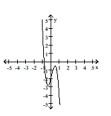
B)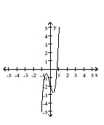
C)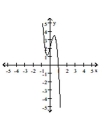
D)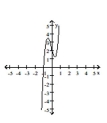
-
A)

B)

C)

D)


Unlock Deck
Unlock for access to all 112 flashcards in this deck.
Unlock Deck
k this deck
46
Determine which of the graphs is the graph of the equation.
-
A)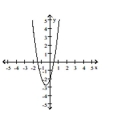
B)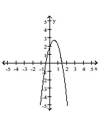
C)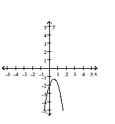
D)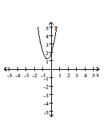
-
A)

B)

C)

D)


Unlock Deck
Unlock for access to all 112 flashcards in this deck.
Unlock Deck
k this deck
47
Determine which of the graphs is the graph of the equation.
-
A)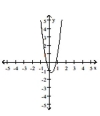
B)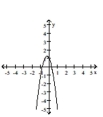
C)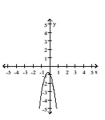
D)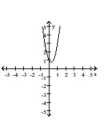
-
A)

B)

C)

D)


Unlock Deck
Unlock for access to all 112 flashcards in this deck.
Unlock Deck
k this deck
48
Solve the problem.
-An object is thrown upward with an initial velocity of 20 feet per second from the top of a 588-foot building. The height of the object at any time t can be described by the polynomial function F Find
The height of the object at t = 5 seconds.
A)-300 ft
B)288 ft
C)608 ft
D)208 ft
-An object is thrown upward with an initial velocity of 20 feet per second from the top of a 588-foot building. The height of the object at any time t can be described by the polynomial function F Find
The height of the object at t = 5 seconds.
A)-300 ft
B)288 ft
C)608 ft
D)208 ft

Unlock Deck
Unlock for access to all 112 flashcards in this deck.
Unlock Deck
k this deck
49
Simplify.
-
A)
B)
C)
D)
-
A)
B)
C)
D)

Unlock Deck
Unlock for access to all 112 flashcards in this deck.
Unlock Deck
k this deck
50
Solve the problem.
-The polynomial describes the average number of digits that participants in a memorization experiment were able to recall after t minutes. Find the number of digits recalled after 9 minutes. Round to the
Nearest digit.
A)46 digits
B)66 digits
C)86 digits
D)106 digits
-The polynomial describes the average number of digits that participants in a memorization experiment were able to recall after t minutes. Find the number of digits recalled after 9 minutes. Round to the
Nearest digit.
A)46 digits
B)66 digits
C)86 digits
D)106 digits

Unlock Deck
Unlock for access to all 112 flashcards in this deck.
Unlock Deck
k this deck
51
Determine which of the graphs is the graph of the equation.
-
A)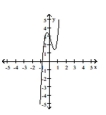
B)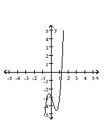
C)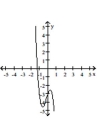
D)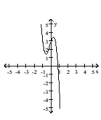
-
A)

B)

C)

D)


Unlock Deck
Unlock for access to all 112 flashcards in this deck.
Unlock Deck
k this deck
52
Solve the problem.
-Total profit is defined as total revenue minus total cost. R(x)is the revenue from the sale of x televisions and C(x)is the cost of producing x televisions.(x)is the cost of producing x televisions. find the profit from the
Sale of 80 televisions.
A)$22,560
B)$14,880
C)$6880
D)$14,560
-Total profit is defined as total revenue minus total cost. R(x)is the revenue from the sale of x televisions and C(x)is the cost of producing x televisions.(x)is the cost of producing x televisions. find the profit from the
Sale of 80 televisions.
A)$22,560
B)$14,880
C)$6880
D)$14,560

Unlock Deck
Unlock for access to all 112 flashcards in this deck.
Unlock Deck
k this deck
53
Simplify.
-
A)
B)
C)
D)
-
A)
B)
C)
D)

Unlock Deck
Unlock for access to all 112 flashcards in this deck.
Unlock Deck
k this deck
54
Simplify.
-
A)
B)
C)
D)
-
A)
B)
C)
D)

Unlock Deck
Unlock for access to all 112 flashcards in this deck.
Unlock Deck
k this deck
55
Simplify.
-
A)
B)
C)
D)
-
A)
B)
C)
D)

Unlock Deck
Unlock for access to all 112 flashcards in this deck.
Unlock Deck
k this deck
56
Simplify.
-
A)
B)
C)
D)
-
A)
B)
C)
D)

Unlock Deck
Unlock for access to all 112 flashcards in this deck.
Unlock Deck
k this deck
57
Simplify.
-
A)8z + 17
B)
C)
D)
-
A)8z + 17
B)
C)
D)

Unlock Deck
Unlock for access to all 112 flashcards in this deck.
Unlock Deck
k this deck
58
Solve the problem.
-Computer sales in the United States have increased since 1992. The function can be used to approximate the number of computer sales during the years 1990-2000 where x is the number of years
After 1990 and f(x)is the computer sales (in millions). Approximate the number of computers sold in 1996.
Round the answer to the nearest tenth of a million.
A)9.7 million
B)11 million
C)9.3 million
D)12.5 million
-Computer sales in the United States have increased since 1992. The function can be used to approximate the number of computer sales during the years 1990-2000 where x is the number of years
After 1990 and f(x)is the computer sales (in millions). Approximate the number of computers sold in 1996.
Round the answer to the nearest tenth of a million.
A)9.7 million
B)11 million
C)9.3 million
D)12.5 million

Unlock Deck
Unlock for access to all 112 flashcards in this deck.
Unlock Deck
k this deck
59
Simplify.
-(
A)
B)
C)
D)
-(
A)
B)
C)
D)

Unlock Deck
Unlock for access to all 112 flashcards in this deck.
Unlock Deck
k this deck
60
Simplify.
-
A)
B)
C)
D)
-
A)
B)
C)
D)

Unlock Deck
Unlock for access to all 112 flashcards in this deck.
Unlock Deck
k this deck
61
Find an expression for the perimeter of the figure.
-
A)
B)
C)
D)
-

A)
B)
C)
D)

Unlock Deck
Unlock for access to all 112 flashcards in this deck.
Unlock Deck
k this deck
62
Simplify.
-
A)
B)
C)
D)
-
A)
B)
C)
D)

Unlock Deck
Unlock for access to all 112 flashcards in this deck.
Unlock Deck
k this deck
63
Find an expression for the perimeter of the figure.
-
A)
B)
C)
D)
-

A)
B)
C)
D)

Unlock Deck
Unlock for access to all 112 flashcards in this deck.
Unlock Deck
k this deck
64
Find an expression for the perimeter of the figure.
-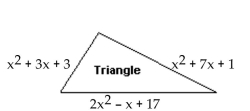
A)
B)
C)
D)
-

A)
B)
C)
D)

Unlock Deck
Unlock for access to all 112 flashcards in this deck.
Unlock Deck
k this deck
65
Multiply.
-
A)
B)
C)
D)
-
A)
B)
C)
D)

Unlock Deck
Unlock for access to all 112 flashcards in this deck.
Unlock Deck
k this deck
66
Simplify. Assume that all exponents represent natural numbers.
-
A)
B)
C)
D)
-
A)
B)
C)
D)

Unlock Deck
Unlock for access to all 112 flashcards in this deck.
Unlock Deck
k this deck
67
Simplify.
Subtract (x - 2)from (8x - 4)
A)8x - 2
B)7x - 6
C)8x - 6
D)7x - 2
Subtract (x - 2)from (8x - 4)
A)8x - 2
B)7x - 6
C)8x - 6
D)7x - 2

Unlock Deck
Unlock for access to all 112 flashcards in this deck.
Unlock Deck
k this deck
68
Simplify.
-
A)
B)
C)
D)
-
A)
B)
C)
D)

Unlock Deck
Unlock for access to all 112 flashcards in this deck.
Unlock Deck
k this deck
69
Simplify.
-
A)
B)
C)
D)
-
A)
B)
C)
D)

Unlock Deck
Unlock for access to all 112 flashcards in this deck.
Unlock Deck
k this deck
70
Simplify.
-Subtract ( from (
A)
B)
C)
D)
-Subtract ( from (
A)
B)
C)
D)

Unlock Deck
Unlock for access to all 112 flashcards in this deck.
Unlock Deck
k this deck
71
Simplify. Assume that all exponents represent natural numbers.
-
A)
B)
C)
D)
-
A)
B)
C)
D)

Unlock Deck
Unlock for access to all 112 flashcards in this deck.
Unlock Deck
k this deck
72
Find an expression for the perimeter of the figure.
-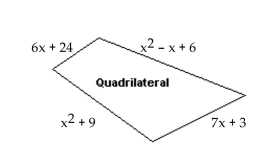
A)
B)
C)
D)
-

A)
B)
C)
D)

Unlock Deck
Unlock for access to all 112 flashcards in this deck.
Unlock Deck
k this deck
73
Simplify.
-Subtract
A)
B)
C)
D)
-Subtract
A)
B)
C)
D)

Unlock Deck
Unlock for access to all 112 flashcards in this deck.
Unlock Deck
k this deck
74
Simplify.
-Add and
A)
B)
C)
D)
-Add and
A)
B)
C)
D)

Unlock Deck
Unlock for access to all 112 flashcards in this deck.
Unlock Deck
k this deck
75
Simplify.
-
A)
B)
C)
D)
-
A)
B)
C)
D)

Unlock Deck
Unlock for access to all 112 flashcards in this deck.
Unlock Deck
k this deck
76
Simplify.
-
A)
B)
C)
D)
-
A)
B)
C)
D)

Unlock Deck
Unlock for access to all 112 flashcards in this deck.
Unlock Deck
k this deck
77
Simplify.
-
A)
B)
C)
D)
-
A)
B)
C)
D)

Unlock Deck
Unlock for access to all 112 flashcards in this deck.
Unlock Deck
k this deck
78
Multiply.
-
A)
B)
C)
D)
-
A)
B)
C)
D)

Unlock Deck
Unlock for access to all 112 flashcards in this deck.
Unlock Deck
k this deck
79
Simplify.
-
A)
B)
C)
D)
-
A)
B)
C)
D)

Unlock Deck
Unlock for access to all 112 flashcards in this deck.
Unlock Deck
k this deck
80
Simplify.
-
A)
B)
C)
D)
-
A)
B)
C)
D)

Unlock Deck
Unlock for access to all 112 flashcards in this deck.
Unlock Deck
k this deck



